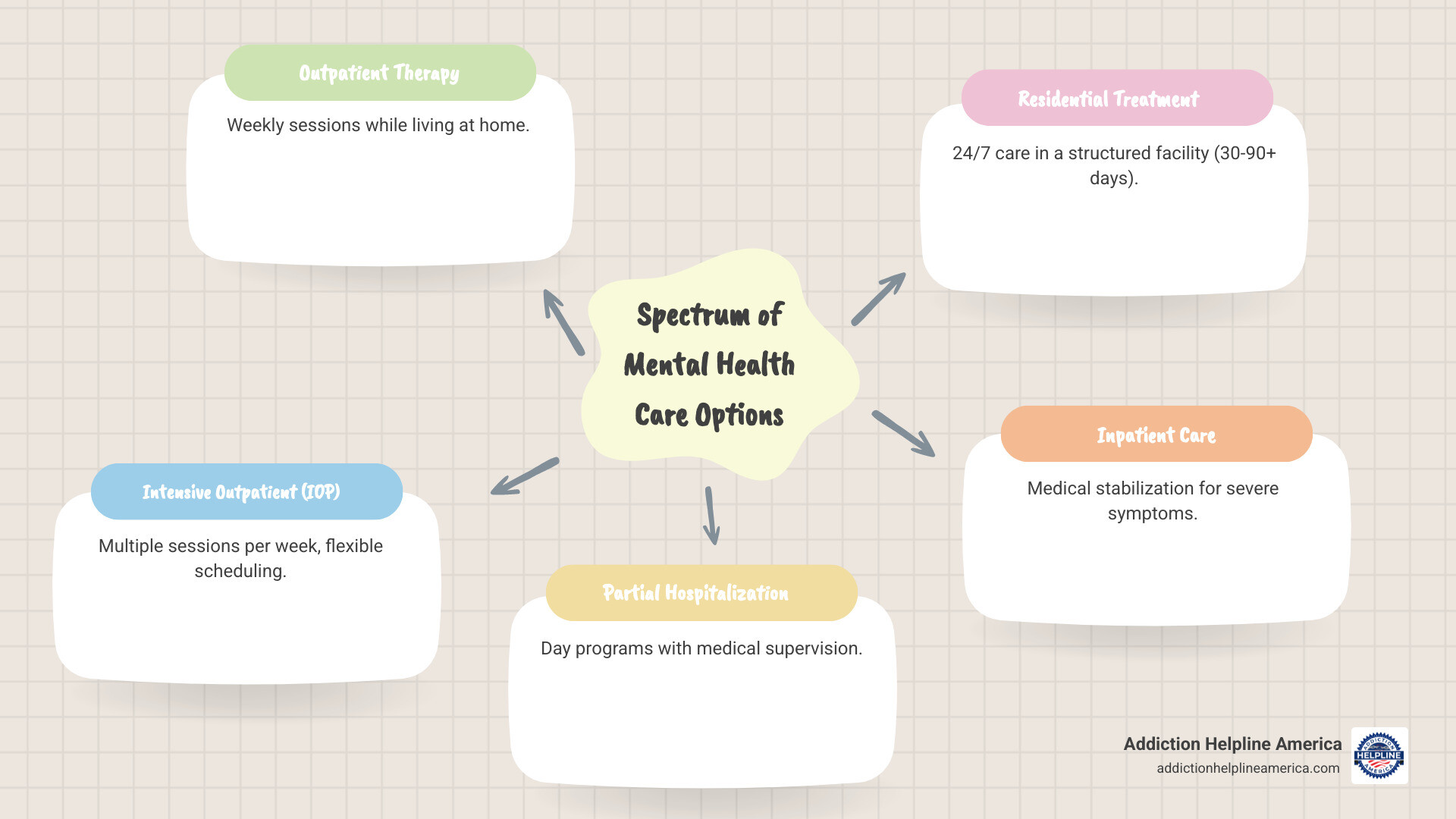
When Daily Life Becomes Overwhelming: Understanding Your Mental Health Options
Mental health rehab offers comprehensive, structured treatment for individuals whose mental health conditions impact their daily life. These programs provide support through various levels of care, from outpatient therapy to residential treatment.
Quick Guide to Mental Health Treatment Levels:
- Outpatient Therapy – Weekly sessions while living at home
- Intensive Outpatient (IOP) – Multiple sessions per week, flexible scheduling
- Partial Hospitalization – Day programs with medical supervision
- Residential Treatment – 24/7 care in a structured facility (30-90+ days)
- Inpatient Care – Medical stabilization for severe symptoms
Mental health issues impact one in five adults in the United States, yet finding the right treatment can feel overwhelming. Whether you’re struggling with depression, anxiety, trauma, or a co-occurring substance use disorder, effective help is available.
The path to recovery isn’t one-size-fits-all. Some people benefit from weekly therapy, while others need the intensive support of residential care. Finding quality treatment that makes a real difference is key.
At Addiction Helpline America, we connect individuals and families with mental health rehab programs that fit their specific needs. Our team understands the challenges of navigating treatment options and provides compassionate guidance to help you find the right level of care.
Recognizing the Need for Professional Help
When self-help and support from loved ones aren’t enough and life feels increasingly overwhelming, mental health rehab can be a life-changing option. Mental health conditions often require more than willpower. When daily functioning is severely impacted—struggling with work, relationships, or basic self-care—it’s a clear sign that professional intervention is needed.
Telling signs include social withdrawal from friends and family, extreme mood changes that feel uncontrollable, and using substances to cope with overwhelming emotions. What starts as occasional relief can quickly become a dangerous pattern.
Signs of a Worsening Mental Health Condition
Acknowledging that things are getting worse is the first courageous step toward recovery. Key signs include:
- Struggling to manage daily tasks: Routine tasks like getting dressed, preparing meals, or basic hygiene can feel monumentally difficult.
- Worsening anxiety or depression: This may appear as persistent worry or a heaviness that typical coping strategies can’t shake.
- Feeling overwhelmed: Even small decisions can feel impossible, a sign of emotional flooding that requires professional support.
- Thoughts of self-harm: This is a critical indicator that immediate professional help is necessary. These thoughts are serious and should never be handled alone.
- Loss of interest in hobbies: Losing interest in activities that once brought joy is another significant red flag.
According to research from the National Alliance on Mental Illness, mental health issues impact millions of Americans each year. These statistics remind us that struggling is common, and seeking help is a sign of wisdom.
When Substance Use and Mental Health Intersect
When mental health struggles and substance use become intertwined, it creates unique challenges that require specialized care. Many people use alcohol or drugs to temporarily quiet anxiety or lift depression, creating a self-medication cycle where substances provide short-term relief but worsen the problem over time.
When a mental health condition and a substance use disorder occur together, it’s called a co-occurring disorder or dual diagnosis. This combination significantly increases health risks and requires a specialized treatment approach.
Substance use can change brain function, worsening mental health conditions, while untreated mental health issues increase vulnerability to substance use. This cycle is difficult to break without professional help.
This is why integrated care is so important. Treating both conditions simultaneously by addressing the root causes and their interplay dramatically improves the chances of long-term recovery in a mental health rehab setting.
Exploring the Landscape of Mental Health Rehab Programs
Mental health rehab is not a one-size-fits-all solution. It’s a continuum of care designed to meet people where they are, with individualized treatment plans matching their specific symptoms and goals. Some individuals thrive with weekly therapy, while others need the intensive support of residential treatment.
Inpatient vs. Outpatient Treatment: What’s the Difference?
Choosing between inpatient and outpatient mental health rehab is a key decision. Both offer valuable support but serve different needs.
Inpatient or residential treatment involves living full-time at a facility with 24/7 supervision in a structured, therapeutic environment. It removes you from daily stressors, allowing you to focus entirely on recovery.
Outpatient treatment allows you to live at home and attend scheduled therapy sessions. This provides flexibility to maintain work, school, or family commitments while receiving support.
| Feature | Inpatient/Residential | Outpatient/IOP |
|---|---|---|
| Structure | 24/7 supervision in residential setting | Live at home, attend scheduled sessions |
| Intensity | Intensive therapy with constant support | Flexible treatment around daily commitments |
| Environment | Safe, therapeutic space away from triggers | Home environment with strong self-management needed |
| Best For | Severe conditions, crisis situations, complex disorders | Mild-to-moderate conditions, step-down care |
| Typical Cost Range | Higher due to residential care and 24/7 staffing | Lower cost with flexible payment options |
Inpatient care is best for severe conditions, crisis situations, or co-occurring disorders. Outpatient programs, including Intensive Outpatient Programs (IOPs), are ideal for mild-to-moderate symptoms when you need to maintain daily routines.
Understanding the Typical Duration of a mental health rehab Program
There is no standard timeline for mental health rehab; the length of your stay depends on your individual progress and the complexity of your condition.
- Short-term programs (around 30 days) focus on stabilization and essential coping skills.
- Long-term programs (60 to 90 days or longer) allow for deeper therapeutic work, especially for complex trauma or co-occurring disorders.
- Extended care programs can last 6 to 9 months for individuals needing more intensive support.
Quality programs regularly evaluate your progress and adjust treatment length accordingly. Many offer step-down programs, gradually transitioning you to lower levels of care to ensure a smooth return to daily life and help prevent relapse.
The Core Components of Effective Treatment
Effective mental health rehab programs share key features: clinical excellence, individualized care, and multidisciplinary teams. Accreditation from bodies like The Joint Commission (JCAHO) or the Commission on Accreditation of Rehabilitation Facilities (CARF) signifies that a facility meets strict standards for safety and quality.
The Role of Evidence-Based and Holistic Therapies
The most effective programs combine scientifically validated treatments with holistic therapies that support overall well-being.
Evidence-based treatments are proven therapies. Cognitive Behavioral Therapy (CBT) helps change negative thought patterns. Dialectical Behavior Therapy (DBT) teaches skills for managing intense emotions. For trauma, EMDR (Eye Movement Desensitization and Reprocessing) can help process difficult memories.
Medication-Assisted Treatment (MAT) may also be used, combining FDA-approved medications with therapy to manage symptoms, especially with co-occurring substance use.
Holistic approaches support the whole person. These include mindfulness practices, yoga, art therapy, and equine therapy, which help connect mind and body and offer non-verbal ways to process emotions.
The Expertise Behind Your Care: Staff Qualifications
A quality mental health rehab program has a multidisciplinary team of experts. This team includes psychiatrists (MDs who diagnose and manage medication), psychologists and licensed therapists (LCSW, LMFT) for counseling, and 24/7 nursing staff for medical support in residential settings. Addiction counselors, dietitians, and case managers provide specialized support for substance use, nutrition, and care coordination.
The Importance of Aftercare and Family Involvement
Recovery is an ongoing process, and effective rehab programs emphasize aftercare planning for sustained recovery.
This includes developing a relapse prevention plan, connecting with alumni programs for peer connection, and joining support groups like Dual Diagnosis Anonymous for ongoing encouragement.
Family involvement is also key. Family therapy sessions help heal relationships, while educational programs for families teach loved ones how to provide effective support. Successful programs help you build a strong support network of friends, mentors, and community connections for long-term wellness.
Navigating Specialized and Co-Occurring Disorder Treatment
Because recovery is a unique journey, many facilities offer custom programs for specific populations, addressing their distinct challenges and triggers. Finding a program that understands your specific situation can make all the difference.
Addressing Co-Occurring Mental Health and Substance Use Disorders
A dual diagnosis or co-occurring disorder—when a mental health issue and substance use disorder exist together—is very common. In 2020, 17 million U.S. adults (6.7%) had co-occurring disorders, yet a vast majority did not receive treatment for both conditions.
The integrated treatment model is crucial. It treats both conditions at the same time, recognizing that they are deeply interconnected and influence each other. Integrated care improves psychiatric outcomes, breaks the self-medication cycle, and addresses the increased health risks associated with dual diagnosis.
Support groups like Dual Diagnosis Anonymous also play a vital role, connecting people who understand the challenge of managing both conditions.
Specialized Programs for Unique Needs
Beyond dual diagnosis, many mental health rehab centers offer specialized programs for groups with unique needs. These can include:
- First responders and military personnel: Programs that address high levels of trauma and PTSD with an understanding of their unique culture.
- Young adults: Treatment focused on identity formation, life skills, and developing healthy coping mechanisms during the critical transition to adulthood.
- Executives and professionals: Discreet, flexible care that addresses burnout, anxiety, and depression while respecting professional responsibilities.
- Gender-specific programs: Women-only or men-only settings that create safe spaces to discuss gender-specific issues, traumas, and societal pressures without inhibition.
How to Choose the Right Mental Health Rehab Facility
Choosing the right mental health rehab facility is about finding the right fit for your unique needs, not a “perfect” center. Making an informed decision starts with asking the right questions.
Ask about staff qualifications and expertise, the types of treatment offered (both evidence-based and holistic), program duration, and family involvement. Inquire about their aftercare planning to ensure you’re set up for long-term success.
Verifying accreditation from organizations like JCAHO or CARF is also important, as it confirms the facility meets high professional standards for safety and care.
Evaluating Costs and Insurance Coverage
Understanding the cost of mental health rehab is a necessary step, and options are usually available to make it affordable.
Start by verifying insurance benefits. We can help you understand your policy, including the cost differences between in-network vs. out-of-network providers. Federal parity laws (ACA and MHPAEA) require most insurance plans to cover mental health care similarly to other medical treatments.
If you don’t have insurance, ask about private pay options, payment plans, or sliding scale fees based on income.
Ensuring Patient Privacy and Confidentiality
Your privacy is legally protected by HIPAA regulations, which ensure your personal health information remains confidential. A quality facility will have strict confidentiality policies to create a safe space for recovery, allowing you to be honest without fear.
You control how your information is shared with family, and a reputable facility will respect your choices regarding secure communication with family. Protecting your privacy in healthcare is a fundamental right that allows you to focus entirely on your healing.
Frequently Asked Questions about Mental Health Rehab
At Addiction Helpline America, we often hear common questions about mental health rehab. Here are answers to some of the most frequent concerns.
What mental health conditions are treated in rehab?
Rehab facilities are equipped to treat a wide range of conditions. Commonly treated conditions include anxiety disorders, depression, bipolar disorder, PTSD and trauma, eating disorders, and personality disorders. Specialized programs also treat severe conditions like schizophrenia and schizoaffective disorder and co-occurring mental health and substance use disorders.
Can I be forced to go to rehab?
Most admissions to mental health rehab are voluntary. Choosing to seek help is a sign of strength, and this motivation is a powerful tool in recovery.
However, involuntary commitment laws exist for situations where an individual is considered a danger to themselves or others and is unwilling or unable to seek help. This is a serious legal and medical process used only to ensure immediate safety and varies by state or province.
What should I pack for a residential stay?
Packing for a residential mental health rehab stay should focus on comfort and recovery. Always check with the facility for their specific list of approved and prohibited items. Key items to bring include:
- Comfortable clothing for various activities and therapy sessions.
- Personal toiletries (non-alcoholic and non-aerosol versions are often required).
- Important documents like your ID, insurance card, and any necessary medical records.
- A journal and pen, books, or simple hobby supplies for downtime.
- A comprehensive list of medications, including all current prescriptions and dosages.
- Comfort items like a special pillow or photos of loved ones to make your room feel more like home.
Conclusion: Taking the First Step on Your Recovery Journey
Recovery is a personal journey, and seeking help is a sign of strength. Choosing mental health rehab is a powerful commitment to your well-being and a better life.
We’ve explored how the right program can offer genuine healing, new coping skills, and renewed hope for conditions like depression, anxiety, trauma, or co-occurring disorders. Finding the program that fits your unique needs is key, and personalized guidance is crucial for finding the best fit.
At Addiction Helpline America, we connect people with life-changing treatment programs. Our team provides free, confidential consultations to help you steer your options. You don’t have to do this alone.
The path to wellness begins with a single step. Your recovery story is waiting to be written.
Find the right mental health treatment program for you and take that first brave step toward the life you deserve.
Our helpline is 100%
free & confidential
If you or someone you care about is struggling with drug or alcohol addiction, we can help you explore your recovery options. Don’t face this challenge alone—seek support from us.
Programs
Resources
Will my insurance
cover addiction
treatment?
We're ready to help
Find the best
drug or alcohol treatment
center
Are you or a loved one struggling with addiction? Call today to speak to a treatment expert.
















